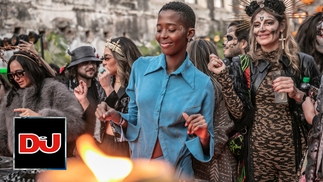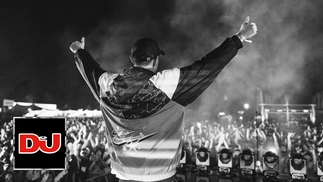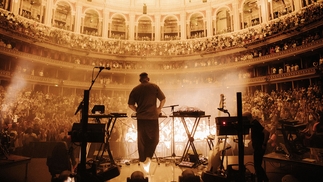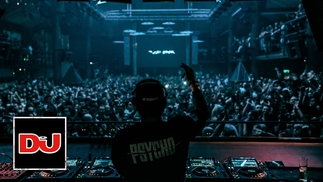HAPPY ACCIDENTS: NANCY WHANG
With a series of brilliant singles and a starring role on the new Juan MacLean album, Nancy Whang is an accidental dance music star...
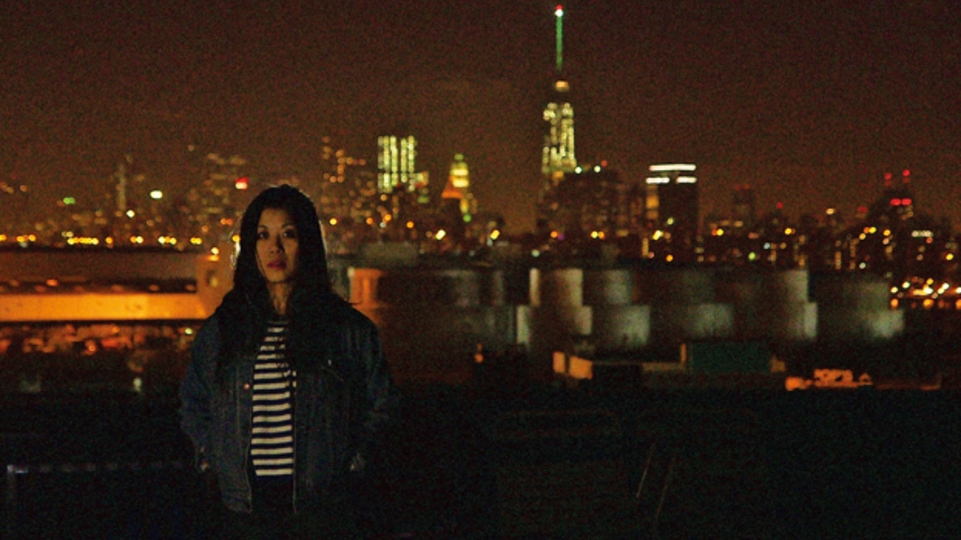
“We would have just looked at it as a free trip to someplace cool,” Nancy Whang says on a steamy summer afternoon in New York City, cooling down with an ice coffee and omurice in an East Village café. “And then we’d play the show and come home with a story.” Nancy Whang is remembering her days playing with DFA label head James Murphy and the rest of the gang from beloved supergroup, LCD Soundsystem — but she could just as well be talking about her entire career. In a time where people will sell their soul for a mere hint of I-wanna-live-forever notoriety, Whang’s casual attitude towards dance music acclaim sets her apart. But make no mistake: Whang is a star. And with the release of four Whang-led versions of classic cuts from the Casablanca discography on the Gomma label, as well as her spotlight role on the brilliant, about-to-drop album from the Juan MacLean, 2014 is set to be the year of her ascension.
SPONTANEOUS
More on the Gomma singles and the upcoming LP in a bit — but first, it’s worth looking back at how Whang, a vocalist, lyricist, keyboardist and DJ, has got to this pinnacle point of her career, if for no other reason than to disprove the theory that laser-focused ambition is a necessary trait to travel the road to success. Whang’s had a spontaneous (at best) way of walking that path. “I had met James [Murphy] just at the beginning of DFA, and we basically became friends and started hanging out,” she says. At some point, James decided to make a song and put out a 12” (she’s referring, in her offhand way, to 2002’s now-iconic ‘Losing My Edge’ by LCD Soundsystem).
“That led to him putting out an LCD Soundsystem album, and that led him to deciding to play that album with a live band — and I was going to be part of that band. I had never done anything like that before. I had never been in a band at all. It was a really gradual process in the beginning — but then we realized that it had become a thing.”
That “thing,” of course, went on to become one of the most influential combos in the world of indie dance (or dance-rock, or punk-funk, or whatever you’d like to call it). Such was LCD’s status that when Murphy decided to pull the plug on the combo in 2011, the farewell concert didn’t get booked in some midsize, outer-borough venue—instead, it was held at NYC's famous Madison Square Garden. Despite the surroundings, Whang is remarkably low-key about what was, for many, a highly emotional event.
“Everything that happened with LCD Soundsystem, culminating in playing the Garden, was a really big deal, and I was really excited about that night,” she explains. “But, in a way, because it was never anything I imagined for myself — the band began as this fun little hobby, really — there wasn’t so much pressure. I actually thought I would cry a bit, but I didn’t. I was just really happy, mainly.” There were plenty of rabid fans in the audience who did shed a few tears, though. “I know — I saw!” she recalls.
NON-DIVA
Whang’s involvement as vocalist with the Juan MacLean — the project led by John “Juan” MacLean (a bit confusing, we know) — began nearly concurrently with the start of her membership with LCD Soundsystem. True to form, it was another offhand hookup. “Juan was making his second 12-inch, ‘You Can't Have It Both Ways’, and he decided he wanted to have female vocals on it,” she explains.
“And so James said, ‘Well, you should use my friend Nancy’. It was just a case of Juan wanted a girl to do vocals, I’m a girl, I knew James — and that was it!” Not that Nancy’s matter-of-fact, decidedly non-diva style of delivery was necessarily what MacLean was looking for. “I think Juan had aspirations to have more of a classic house style of vocal, really. But there was a balance between the music that Juan was making and where I was coming from, which was a kind of punky aesthetic. And I think it worked.”
Her current Casablanca-tribute releases do more than work — they kill. Once again, they came about in an informal kind of way. “I knew Gomma from a long time ago through Munk [producer Mathias Modica], who’s one of the guys behind the label,” Whang says. “About 10 years ago, he asked James to do the vocals for a track called ‘Kick Out the Chairs’— James and I ended up doing the vocals for it together, and we kind of kept in touch. Gomma had already released that first suite of Casablanca songs [with Peaches as the featured vocalist] and about two years ago they were getting ready to do the second, and they got in touch. I wasn’t doing anything — I was conspicuously unbusy — so I said ‘sure, why not?’”
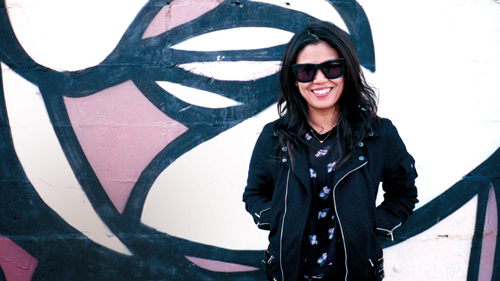
DISCO VERSIONS
First up was a collaboration between Whang and 2020 Vision duo Audiojack, teaming up to take on Dennis Parker’s glorious 1979 tune, ‘Like an Eagle.’ The original, produced by Village People mastermind Jacques Morali, is a beautiful and haunting urban hymn, an ode to the never-ending quest for human connection— and boasts one of the biggest, soaring choruses known to disco.
Whang and Audiojack’s take, released this past March, keeps the melancholic-sleaze feel intact— with the cut’s poignant, minor-key melody and lyrics like “I search through the city... always hungry, always wanting,” it would be hard not to — but cranks up the tempo and replaces the original’s ornate instrumentation with percolating, atmospheric synth work. And when that wordless, cooing chorus kicks in, it comes close to transcendence.
“‘Like an Eagle’ was a pretty easy one to pick,” Whang says. “I’ve always liked that song, and that chorus is so amazing. The original video for it is amazing, too.” She’s right: It features Parker emoting his heart out, giving his all in the shiniest silver suit you’re ever likely to see. Parker’s backstory adds another layer to the song’s appeal. Before his disco career, he was a porn actor (in both straight and gay films), working under the name Wade Nichols; in the early ’80s, he starred in the daytime soap opera The Edge of Night as a police captain; and, following a long illness, he died in 1985, perhaps (according to some reports) by taking his own life. “The song is so epic and uplifting,” Whang says, “and when you watch that video, he looks really happy. But you get this sense that he has a really troubled life, a troubled psyche. That gives another dimension to the song, I think.”
Whang’s second Casablanca single has her working with PBR Streetgang’s Bonar Bradberry; the EP covers another moody Casablanca classic, Donna Summer’s Giorgio Moroder–produced ‘Working the Midnight Shift.’ It’s one of the late disco diva’s darkest tunes, and its air of streetlight gloom is captured perfectly in the pair’s new version, with Whang’s resigned, what-is-there-to-live-for vocals hovering over Bradberry’s interpretation of Moroder-style arpeggios and kicks. The dejection the song projects is palpable — which is not to say the cut isn’t capable of filling a dancefloor (the bassline of the extended mix, for example, is simply devastating).
“That is just such a classic Donna Summer song,” Whang states. “It’s like the flip-side of a song like ‘Love to Love You Baby,’ which makes everything sound so wonderful and perfect. But it’s really not perfect, and that’s what ‘Working the Midnight Shift’ is about. It’s a little dark, really. There’s a story behind the recording of that. She and Moroder apparently had been working for days and days and days, and this was the last song they recorded; her voice just sounds so tired and spent. They really just pushed it out, and I think that gives it this really raw sound.”
There are two more Whang collaborations coming out in this run of Casablanca collaborations. Next up is another version of ‘Like an Eagle’ (she really likes that song), with the French vet Étienne de Crécy at the controls. “This will obviously be a different version — and since Étienne is French, I sing it in French, which makes it ever more different.” And the fourth and final installment? “It’s a surprise,” is all she’ll say — though we’d wager that it won’t be yet another take on ‘Like an Eagle’.
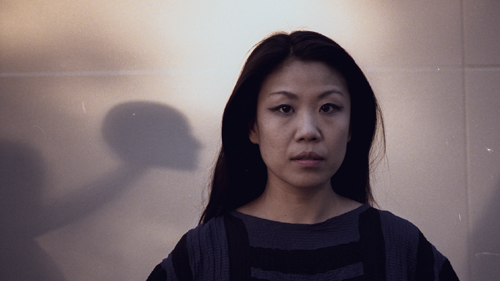
IN A DREAM
The pièce de résistance of Whang’s sparkling year just might be the upcoming release of the new LP from The Juan MacLean, coming out in September on DFA. In true Whang fashion, her involvement in the new album wasn’t exactly part of a master-plan. “I was a little reluctant to get involved with that at first,” she says with a laugh. “I felt like I didn’t want to be in somebody else’s band again. But I finally thought, well, I’m not fucking doing anything anyway... I was actually starting to go a little nuts.”
The album’s called ‘In a Dream,’ and that’s an apt title; the set is a reverie of kaleidoscopic, ambrosial electronic pop.
The songs are more fully fleshed-out than ever, with Whang and MacLean exhibiting the kind of songwriting chops only hinted at on 2009’s ‘The Future Will Come'. And it’s not just the music, but also the lyrics: there’s considerably more emotional complexity expressed by these songs, at least obliquely, than by the normal “Hey, baby, let’s party” dance tune; moods like sorrow, resignation and antipathy mingle with good old love and happiness here. “I can’t really write the average dance music lyrics, I don’t think,” Whang offers by way of explanation.
“In most dance music, I think there’s a list of words that you’re supposed to use, and certain sentiments — passion, longing, denial or whatever —that you have to express with those words. It should be easy, because the emotions those songs express are such universal sentiments, but there’s an art and a nuance to it that I don’t really have. Sometimes I’ll try to write like that, and I’ll be like, why isn’t this working? Why isn’t this like all those other songs? I mean, I can use the same words they do, but they come out different. It’s just not how I write.” MacLean himself puts his finger on where her songwriting skills do lie.
“Nancy’s really good at writing pop hooks and big choruses, which is something I’m kind of incapable of doing,” he says. “I’ll have these pieces of music that aren’t all that dramatically melodic, and Nancy can take that and come up with something that is very melodic for it, like a classic pop chorus.”
More than ever, at least where the vocals are concerned, this is Whang’s show. That’s evident as soon as you look at the album. Shot by Timothy Saccenti, with art direction by Michael Vadino and Rachael Millkey, the gorgeous cover — a fractured take on a classic, Richard Avedon–style black-and-white glamour shot — shows Whang leaning forward, an ebony cast of Juan’s head placed face-up beside her. On the songs themselves, the pair’s Human League–inspired boy-girl tradeoff vocals are largely gone; more often than not, Whang takes the lead. And on the songs where they do share the mic, their voices work together, rather than in opposition. “That girl-guy dynamic isn’t such a novelty for us anymore,” Whang says. “I think that’s allowed us to go beyond that a bit, and settle into this entity, this single thing. We’re more integrated than we ever were before.”
So what’s the next step on Whang’s rise to the top of the dance-music heap? “I’m not really sure yet!” she admits, not surprisingly. “But it actually might not be dance music at all.” But she’s certainly grateful for where this world has taken her over the past 12 years. “I never thought I would play music for a living,” she says, with a hint of amazement in her voice. “I mean, before LCD Soundsystem, I wasn’t even thinking about this. So I have such a great appreciation for the opportunities that have been afforded me... but it’s still so weird!” Weird for her, maybe — but lucky, very lucky, for the rest of us.
BRUCE TANTUM
